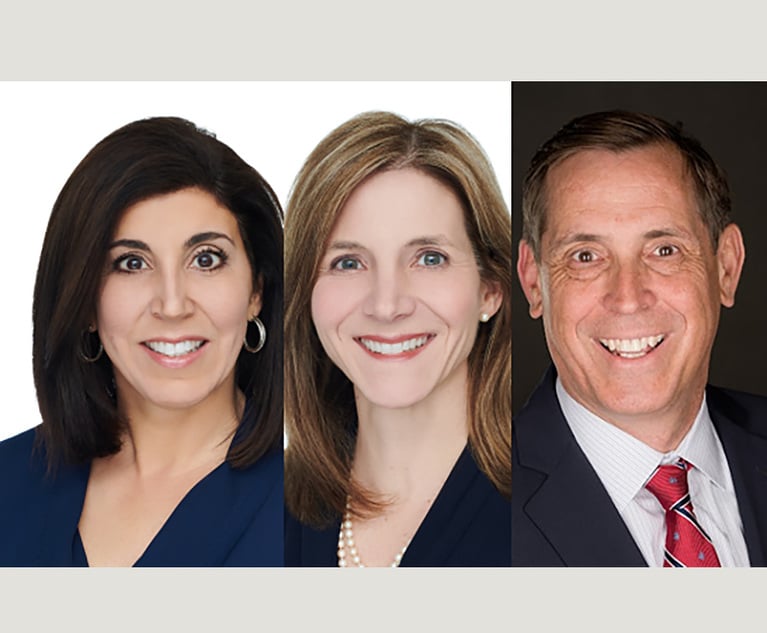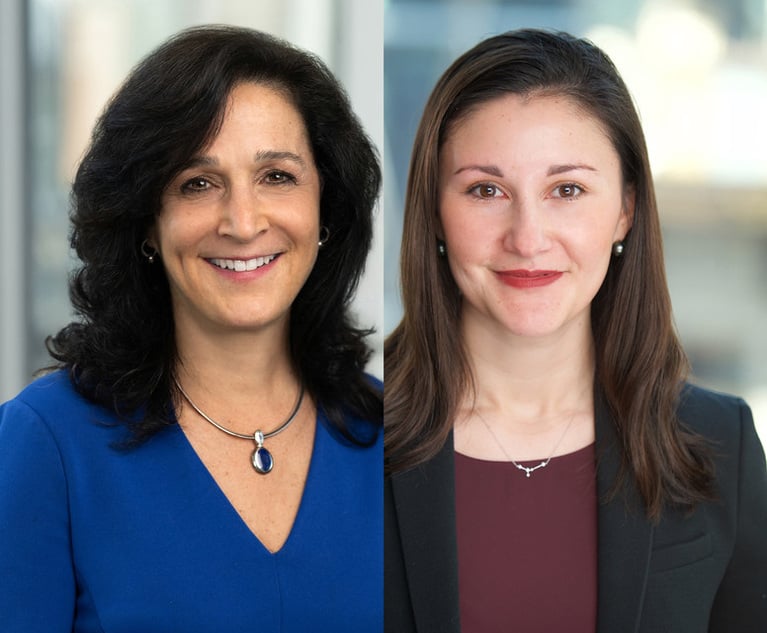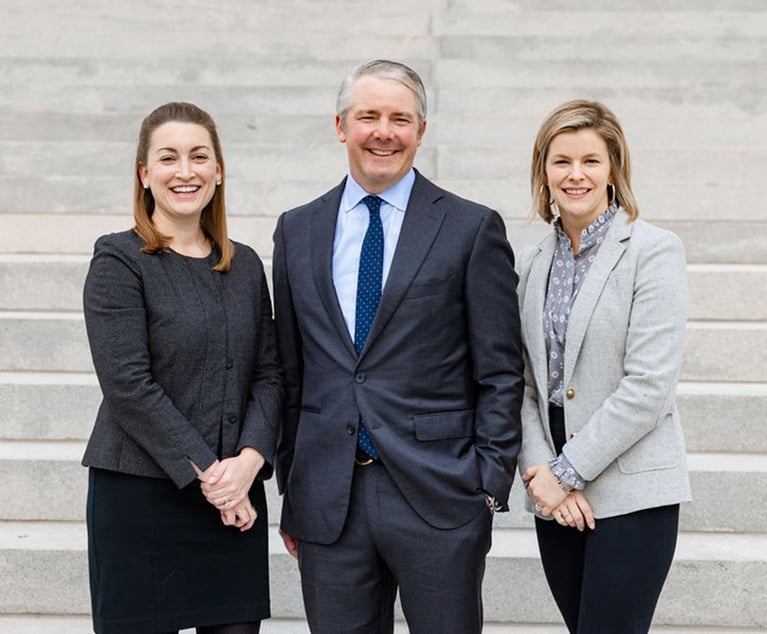 E. Barrett Prettyman U.S. District Courthouse in Washington, D.C. Photo: Diego M. Radzinschi/ALM.
E. Barrett Prettyman U.S. District Courthouse in Washington, D.C. Photo: Diego M. Radzinschi/ALM.Just the Papers Please: DC Circuit Scraps More Oral Arguments During COVID-19
The D.C. Circuit said it will skip arguments and instead rule on the briefs in 13 cases so far since the court announced it would stop holding in-person proceedings during the COVID-19 pandemic.
April 14, 2020 at 04:50 PM
7 minute read
The U.S. Court of Appeals for the D.C. Circuit has recently decided to rule on more cases without hearing oral arguments, a trend the court's clerk linked to "current circumstances" during the ongoing COVID-19 pandemic.
It's not uncommon for the D.C. Circuit to rule on a case solely on the briefs. However, there has been a noticeable uptick of those decisions since the court's March 17 order postponing all in-person oral arguments in light of the pandemic, and giving individual panels the option to hear phone arguments, postpone hearings to a later date or forgo arguments altogether.
A review of the circuit's calendar going back to September 2019 shows judges decided to rule on the papers in 38 cases before the court stopped holding in-person oral arguments last month. Since then, panels have said they will rule on 13 cases without holding oral arguments.
It's unclear why the judges made those decisions, as they're made at the discretion of individual panels without a public explanation. Circuit rules say panels can choose to go without oral arguments if the judges unanimously find: "(A) the appeal is frivolous; (B) the dispositive issue or issues have been authoritatively decided; or (C) the facts and legal arguments are adequately presented in the briefs and record, and the decisional process would not be significantly aided by oral argument."
Mark Langer, clerk of the court for the circuit, said in an email Tuesday that the D.C. Circuit does appear to be deciding more cases on the briefs than earlier in the court's 2019-20 term. He said anecdotal comments from clerks in other circuits indicate the same thing is happening in their courts.
"Clerk's office staff aren't privy to the panel's decision making when deciding not to hold oral argument in any particular case, but I am certain the current circumstances have influenced their decisions," Langer wrote.
Just as the number of total cases presented to the circuit fluctuates each year, so does the number of cases the D.C. appeals judges rule on without hearing arguments: During the 2018-19 term, 25 cases were designated to forgo arguments, while in 2017-18, judges skipped hearings in 48 cases.
Attorneys can file a motion within 10 days challenging a panel's order canceling oral arguments, but circuit rules say such motions "are disfavored." As of publication time on Tuesday, no such motions had been filed.
Some panels are moving forward with their full slate of scheduled arguments, which are now being held over the phone and livestreamed by the circuit on YouTube. Lawyers who have participated in the phone arguments with the D.C. Circuit previously said court staff told them the circuit wants to hold as many arguments telephonically as possible.
Other panels are deciding to hear arguments in some cases and scrap others also scheduled for the same day. And still others are choosing to cancel all arguments scheduled on a given day and rely on the briefs for those cases.
Appellate attorneys who were set to argue before the judges said in interviews that they don't want to participate in oral arguments if the court wouldn't find them helpful. However, several wondered why the panels decided to rule on their briefs while phone arguments are an option.
The attorney hit hardest by the recent decisions to not hold oral arguments is Larry Klayman, the conservative and litigious founder of the groups Judicial Watch and Freedom Watch. He was set to argue three cases before the circuit, all of which will now be ruled on the briefs.
Klayman said Tuesday that one of the cases, which centers around whether a lawsuit can be served over Twitter, can likely be determined on the papers and he will not challenge that decision. But he said he will protest orders in two other cases, including one brought against the social media giants alleging political discrimination against conservatives on the platforms.
"I want the judge to be able to ask questions and think about these things, rather than just doing it in a medicinal way," Klayman said.
A hearing committee for the D.C. Court of Appeals Board on Professional Responsibility recommended in July that Klayman's license to practice law in D.C. be suspended for 33 months, after they found he violated the D.C. Bar's rules of professional conduct. Klayman has disputed those findings and the recommendation, and no formal disciplinary action has been taken.
D.C. Attorney General Karl Racine's office sought argument time in Klayman's case against the social media giants, as part of the complaint alleges the tech companies are "places of public accommodation" under the District of Columbia Human Rights Act. U.S. District Judge Trevor McFadden had ruled such places had to be physical locations, and the D.C. lawyers want the appeals court to overturn that finding, but no argument at all means theirs points will be presented to the court in their amicus brief.
Karla Grossenbacher, a partner at Seyfarth Shaw who chairs the D.C. office's labor and employment practice, is another attorney whose case will be decided on the briefs. She said she believed oral argument was not necessary in the case.
Grossenbacher said she doesn't believe many cases are won or lost at oral arguments, but the hearings can serve as an opportunity for judges to try and sway fellow jurists toward their thinking on a particular case.
"Sometimes the arguments can be useful for the judges to test their theories and convince each other," Grossenbacher said.
Howard Foster, a RICO attorney based out of Chicago, was set to argue a case on behalf of the Center for Immigration Studies before the court on Wednesday. But the panel issued an order scrapping the argument a week before it was to take place.
"I don't know why they don't have the same number of oral arguments they were planning to before by phone," Foster.
In remarks echoed by other lawyers, Foster said he doesn't want to have to argue before the court if judges don't believe it will be helpful. Oral arguments can rack up travel and preparation expenses for firms, which are already experiencing budget restraints during the economic downturn sparked by the pandemic.
"My attitude is if the court believes it's helpful and they have real questions, then it's worth having an oral argument," Foster said. "If they don't, oral arguments can be a waste of everybody's time if the judges don't really want to have them."
Oral arguments have been steadily declining from appeals courts in the past few decades, with data released by the judiciary showing only about 20% of cases land argument time compared with 40% a couple decades ago.
Attorneys, including Grossenbacher, said they don't believe the pandemic will cause oral arguments to disappear entirely. But some said it could help facilitate the trend.
"I think it'll make it easier for some of the judges just to rule on the briefs and make up their own minds," said John Karl Jr., of counsel for the firm Alderman, Devorsetz & Hora. "I think it may very well accelerate a trend."
"But I would think, if I were a judge, it would be fun to have everyone come in and hash it out," he added.
Michael Eisenberg, a solo practitioner who regularly argues military cases before the D.C. Circuit, had his oral argument canceled one week before the circuit issued its order freezing in-person arguments.
He said the military members and veterans he often represents find it valuable to see the court hear arguments in their cases, which sometimes center on their military records, because it's a clear indication that their issues are taken seriously. "It is an opportunity to really shine a light on their case," Eisenberg said.
This content has been archived. It is available through our partners, LexisNexis® and Bloomberg Law.
To view this content, please continue to their sites.
Not a Lexis Subscriber?
Subscribe Now
Not a Bloomberg Law Subscriber?
Subscribe Now
NOT FOR REPRINT
© 2025 ALM Global, LLC, All Rights Reserved. Request academic re-use from www.copyright.com. All other uses, submit a request to [email protected]. For more information visit Asset & Logo Licensing.
You Might Like
View All
‘Issue of First Impression’: New York Judge Clears Coinbase Appeal Amid Crypto Regulatory Clash
4 minute read
DC's Birchstone Moore Combines With Chicago-Founded Wealth Planning Firm
3 minute read

Law Firms Mentioned
Trending Stories
- 1Legal Tech's Predictions for Knowledge Management in 2025
- 2Fenwick Shutters Shanghai Office
- 3Litigators of the (Past) Week: Defending Against a $290M Claim and Scoring a $116M Win in Drug Patent Fight
- 4Litigator of the Week Runners-Up and Shout-Outs
- 5Am Law 50's Head Count 'Holding Pattern' Could Trickle Down
Who Got The Work
Michael G. Bongiorno, Andrew Scott Dulberg and Elizabeth E. Driscoll from Wilmer Cutler Pickering Hale and Dorr have stepped in to represent Symbotic Inc., an A.I.-enabled technology platform that focuses on increasing supply chain efficiency, and other defendants in a pending shareholder derivative lawsuit. The case, filed Oct. 2 in Massachusetts District Court by the Brown Law Firm on behalf of Stephen Austen, accuses certain officers and directors of misleading investors in regard to Symbotic's potential for margin growth by failing to disclose that the company was not equipped to timely deploy its systems or manage expenses through project delays. The case, assigned to U.S. District Judge Nathaniel M. Gorton, is 1:24-cv-12522, Austen v. Cohen et al.
Who Got The Work
Edmund Polubinski and Marie Killmond of Davis Polk & Wardwell have entered appearances for data platform software development company MongoDB and other defendants in a pending shareholder derivative lawsuit. The action, filed Oct. 7 in New York Southern District Court by the Brown Law Firm, accuses the company's directors and/or officers of falsely expressing confidence in the company’s restructuring of its sales incentive plan and downplaying the severity of decreases in its upfront commitments. The case is 1:24-cv-07594, Roy v. Ittycheria et al.
Who Got The Work
Amy O. Bruchs and Kurt F. Ellison of Michael Best & Friedrich have entered appearances for Epic Systems Corp. in a pending employment discrimination lawsuit. The suit was filed Sept. 7 in Wisconsin Western District Court by Levine Eisberner LLC and Siri & Glimstad on behalf of a project manager who claims that he was wrongfully terminated after applying for a religious exemption to the defendant's COVID-19 vaccine mandate. The case, assigned to U.S. Magistrate Judge Anita Marie Boor, is 3:24-cv-00630, Secker, Nathan v. Epic Systems Corporation.
Who Got The Work
David X. Sullivan, Thomas J. Finn and Gregory A. Hall from McCarter & English have entered appearances for Sunrun Installation Services in a pending civil rights lawsuit. The complaint was filed Sept. 4 in Connecticut District Court by attorney Robert M. Berke on behalf of former employee George Edward Steins, who was arrested and charged with employing an unregistered home improvement salesperson. The complaint alleges that had Sunrun informed the Connecticut Department of Consumer Protection that the plaintiff's employment had ended in 2017 and that he no longer held Sunrun's home improvement contractor license, he would not have been hit with charges, which were dismissed in May 2024. The case, assigned to U.S. District Judge Jeffrey A. Meyer, is 3:24-cv-01423, Steins v. Sunrun, Inc. et al.
Who Got The Work
Greenberg Traurig shareholder Joshua L. Raskin has entered an appearance for boohoo.com UK Ltd. in a pending patent infringement lawsuit. The suit, filed Sept. 3 in Texas Eastern District Court by Rozier Hardt McDonough on behalf of Alto Dynamics, asserts five patents related to an online shopping platform. The case, assigned to U.S. District Judge Rodney Gilstrap, is 2:24-cv-00719, Alto Dynamics, LLC v. boohoo.com UK Limited.
Featured Firms
Law Offices of Gary Martin Hays & Associates, P.C.
(470) 294-1674
Law Offices of Mark E. Salomone
(857) 444-6468
Smith & Hassler
(713) 739-1250










